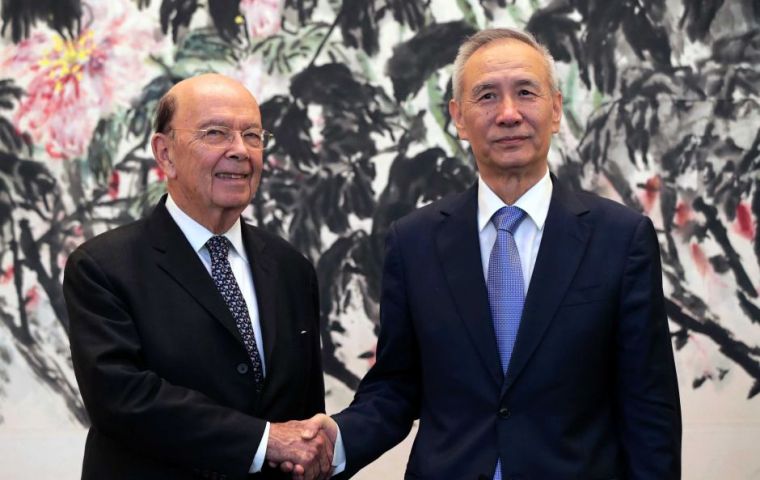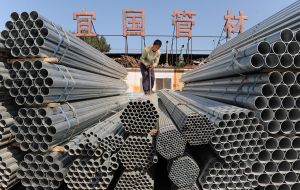MercoPress. South Atlantic News Agency
Trade deal falls warns China, if US insists with imposing more tariffs
 China’s warning came after U.S. Commerce Secretary Wilbur Ross and China’s top economic official, Vice Premier Liu He, wrapped up a meeting in Beijing
China’s warning came after U.S. Commerce Secretary Wilbur Ross and China’s top economic official, Vice Premier Liu He, wrapped up a meeting in Beijing  US has threatened to impose tariffs on up to US$ 50 billion of Chinese products in a dispute over Beijing’s aggressive tactics to challenge U.S. technological dominance
US has threatened to impose tariffs on up to US$ 50 billion of Chinese products in a dispute over Beijing’s aggressive tactics to challenge U.S. technological dominance China said on Sunday it wouldn’t step up its purchases of United States products if President Donald Trump goes ahead with his threat to tax billions of dollars’ worth of Chinese imports. White House advisers insisted on fundamental changes in ties between the world’s two biggest economic powers.
China’s warning came after delegations led by U.S. Commerce Secretary Wilbur Ross and China’s top economic official, Vice Premier Liu He, wrapped up a meeting on Beijing’s pledge to narrow its trade surplus. Ross said at the start of the event they had discussed specific American exports China might purchase, but the talks ended with no joint statement and neither side released details.
“Both sides appear to have hardened their negotiating stances and are waiting for the other side to blink,” said Eswar Prasad, professor of trade policy at Cornell University. “Despite the potential negative repercussions for both economies, the risk of a full-blown China-U.S. trade war, with tariffs and other trade sanctions being imposed by both sides, has risen significantly.”
Asked specifically on Fox’s “Sunday Morning Futures” if the U.S. is willing to throw away its relationship with China by proceeding with threatened tariff hikes, Peter Navarro, director of the White House National Trade Council, pointed in part to an unfair relationship involving a multi-billion dollar trade deficit, Defense Secretary Jim Mattis’ warning of China’s activities in the South China Sea and the threat of China stealing U.S. intellectual property.
“That’s a relationship with China that structurally has to change,” he said. “We would love to have a peaceful, friendly relationship with China. But we’re also standing firm that the president is the leader on this.”
The United States has threatened to impose tariffs on up to US$ 50 billion of Chinese products in a dispute over Beijing’s aggressive tactics to challenge U.S. technological dominance; Trump has asked U.S. Trade Rep. Robert Lighthizer to look for another US$ 100 billion in Chinese products to tax. China has targeted US$ 50 billion in U.S. products in retaliation.
Tensions temporarily eased on May 19 after China promised to “significantly increase” its purchases of U.S. farm, energy and other products. Treasury Secretary Steven Mnuchin said then that the U.S. tariffs were suspended and the trade war “on hold.”
The purchases are meant to reduce America’s massive trade deficit in goods and services with China, which last year came to US$ 337 billion, according to the U.S. Commerce Department.
After the apparent cease-fire, global financial markets rallied in relief.
But Trump upended the truce last Tuesday by renewing his threat to impose 25% tariffs on US$ 50 billion in Chinese high-tech goods. The tariffs are meant to pressure Beijing for allegedly stealing trade secrets and forcing foreign companies to hand over technology in exchange for access to the Chinese market.
Navarro later called Mnuchin’s conciliatory comments “an unfortunate soundbite.”
Ross nonetheless journeyed to Beijing Friday to work out details of the vague agreement Mnuchin had earlier cobbled together with the Chinese vice premier.
China balked at making concessions unless the U.S. lifted the tariff threat.
“If the United States introduces trade sanctions including a tariff increase, all the economic and trade achievements negotiated by the two parties will not take effect,” said a Chinese government statement, carried by the official Xinhua News Agency.




Top Comments
Disclaimer & comment rules-

Read all commentsWhat's wrong if the population is glad to pay higher prices?
Jun 12th, 2018 - 03:09 pm 0Commenting for this story is now closed.
If you have a Facebook account, become a fan and comment on our Facebook Page!